The administration of U.S. President Joe Biden on Sunday described a predicted invasion of Ukraine by Russian forces as “imminent enough” after appearing to promise not to use the word “imminent,” as it clearly outraged officials in Kyiv.
Biden officials have repeatedly claimed for more than a month that a full-scale Russian invasion of Ukraine was “imminent,” prompting protests in the country from officials who complained that the reality on the ground on Ukraine’s eastern border did not match the rhetoric out of the White House and that the latter was tanking Ukraine’s economy – making an invasion more likely.
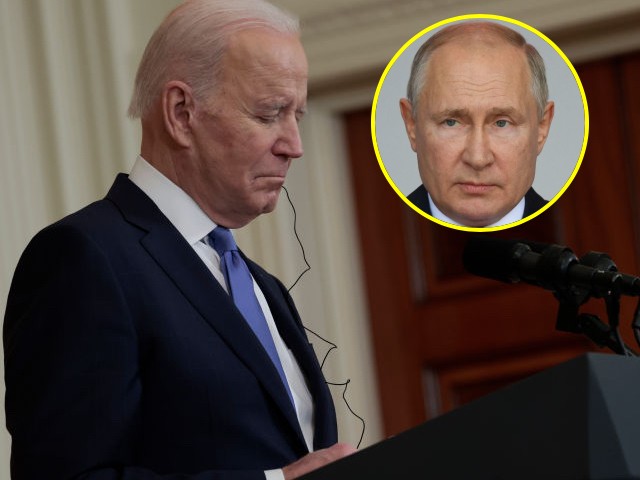
U.S. President Joe Biden speaks during a joint news conference with German Chancellor Olaf Scholz in the East Room of the White House on February 07, 2022 (Anna Moneymaker/Getty Images).
In early February, Biden officials appeared to announce a retirement of the use of the word “imminent” given the growing discontent in Ukraine, bizarrely claiming that the discord between Washington and Kyiv was a product of how the word translated into Ukrainian.
“I think there were some issues about how that word translates in Ukraine, literally,” Pentagon spokesman John Kirby said.
Ukrainian President Volodymyr Zelensky speaks English well and Ukrainian poorly. His first language is Russian.
Russia invaded Ukraine in 2014, when Biden was vice president, and continues to maintain an illegal presence in Crimea and the war-torn Donbas region of eastern Ukraine. Concerns of yet another Russian military operation against the country began in January after Biden suggested to reporters that he would not intervene to defend Ukraine, an American ally, in the event of a “minor incursion” into the country. Biden never defined what the difference between a “minor incursion” and an “invasion” was and his officials have loudly warned of an “imminent” invasion since.
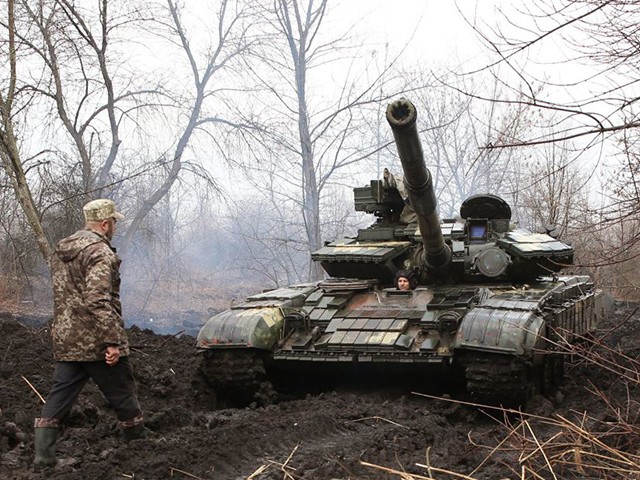
Ukrainian servicemen work on their tank close to the front line with Russian-backed separatists near Lysychansk, Lugansk region on April 7, 2021 (STR/AFP via Getty Images).
Zelensky has repeatedly attempted to clarify to international journalists that his government has no indication that Russian leader Vladimir Putin will soon invade or that there will be “tanks on the streets” in Kyiv, hundreds of miles from the Russian border, anytime soon. The Biden White House has nonetheless dramatically urged Americans in Kyiv to leave to avoid “crossfire” and evacuated its embassy this weekend.
The word “imminent” made a conditioned return during a press conference Secretary of State Antony Blinken held in Hawaii on Sunday with his counterparts from Japan and South Korea. Blinken bizarrely shifted from Indo-Pacific concerns to discuss the situation in Ukraine prior to letting the foreign ministers speak, stating he had recently spoken to Russian Foreign Minister Sergey Lavrov about an alleged Russian invasion of that country to begin “in the coming days.”
“Yesterday, we ordered the departure of most of the Americans still at the U.S. embassy in Kyiv. The risk of Russian military action is high enough,” Blinken said, “and the threat is imminent enough, that this is the prudent thing to do. No one should be surprised if Russia instigates a provocation or incident, which it then uses to justify military action it had planned all along.”
Blinken’s description of an alleged renewed Russia as “imminent enough” appears to violate White House press secretary Jen Psaki’s administration moratorium on the use of the descriptor for the situation on the Russo-Ukrainian border.
“I used that [the word imminent] once,” Psaki said on February 2. “And then we stopped using it because I think it sent an — a message that we weren’t intending to send, which was that we knew that President Putin had made a decision.”
“I would say the vast majority of times I’ve talked about it, we said, ‘He could invade at any time.’ That’s true; we still don’t know that he’s made a decision,” Psaki claimed.
Biden himself said during the fateful “minor incursion” press conference that he believed Putin had decided to invade again.
Blinken’s comments on Sunday occurred less than 24 hours after Zelensky again denied having any information that made predictions of an imminent invasion reasonable.
“If you or anyone has any additional information about a 100-percent chance of an invasion,” Zelensky told reporters on Sunday, “give it to us.”
The president once again insisted that his “people’s biggest enemy is panic in our country” and lamented that the Biden White House was stoking unnecessary panic.
“All this information is only provoking panic and not helping us,” Zelensky said.
Zelensky spoke to Biden during an hour-long phone call the next day. According to the office of the Ukrainian presidency, Zelensky invited Biden to Kyiv to assess the situation for himself before continuing to scare Americans into leaving.
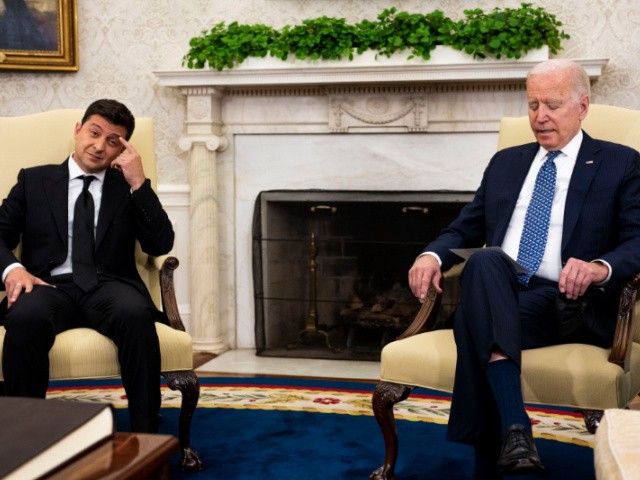
Ukrainian President Volodymyr Zelensky (L) meets with U.S. President Joe Biden in the Oval Office at the White House on September 01, 2021 (Doug Mills-Pool/Getty Images).
“I am convinced that your arrival in Kyiv in the coming days, which are crucial for stabilizing the situation, will be a powerful signal and contribute to de-escalation,” the Ukrainian presidential office quoted Zelensky as saying.
The White House notably omitted that invitation from its readout of the call.
In an animated press conference at the end of January, Zelensky made the same invitation to all international journalists and those believing the entire nation would soon fall under Russian colonization.
“If they want to know what the situation is, they can come to Kyiv. Do we have tanks on the street? No,” Zelensky told reporters. “The feeling is, if you’re not here, the feeling is … the image that mass media create is that we have troops on the roads, we have mobilization, people are leaving for places – that’s not the case.”
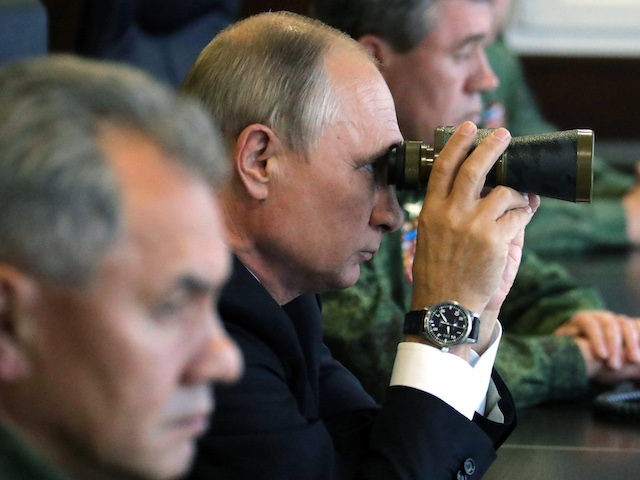
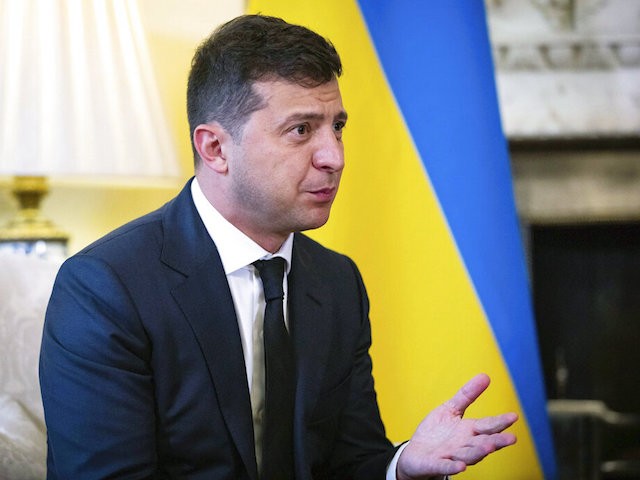
COMMENTS
Please let us know if you're having issues with commenting.